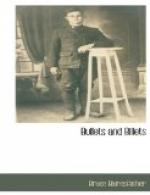CHAPTER V
My man Friday—“Chuck
us the
biscuits”—Relieved—billets
It was during this first time up in the trenches that I got a soldier servant.
As I had arrived only just in time to go with the battalion to the trenches, the acquisition had to be made by a search in the mud. I found a fellow who hadn’t been an officer’s servant before, but who wanted to be. I liked the look of him; so feeling rather like Robinson Crusoe, when he booked up Friday, “I got me a man.”
He lived in a dug-out about five yards away, and from then onwards continued with me right to the point where this book finishes. This fellow of mine did all my cooking, such as it was, and worked in conjunction with my friend, the platoon commander’s servant. Cooking, at the times I write about, consisted of making innumerable brews of tea, and opening tins of bully and Maconochie. Occasionally bacon had to be fried in a mess-tin lid. One day my man soared off into culinary fancies and curried a Maconochie. I have never quite forgiven him for this; I am nearly right again now.
These two soldier servants never had to leave the trench. It was their job to try and find something to make a fire with, and to do all they could to keep the water out of our dug-out, a task which not one of us succeeded in doing. My plan for sustaining life under these conditions was to change my boots as often as possible. If there wasn’t time for this I used to try and boil the water in my boots by keeping my feet to the fire bucket. I always put my puttees on first and then a pair of thick socks, and finally a pair of boots. I could, by this means, hurriedly slip off the sodden pair of boots and socks and slip on another set which had become fairly dry by the fire. We lived perpetually damp, if not thoroughly wet. My puttees, which I rarely removed, were more like long rolls of the consistency of nougat than anything else, thanks to the mud. Dug-outs had no wooden linings in those days; no corrugated iron roofs; no floorboards. They were just holes in the clay side of the fire trench, with any old thing for a roof, and old straw or tobacco leaves, which we pinched from some abandoned farm, for a floor. So, you see, there was not much of a chance of dodging the moisture.
The cold was what got me. Personally, I would far rather have gone without food than a fire. A fire of some sort was the only thing to cheer. Coke was scarce and always wet, and it was by no means uncommon to over-hear a remark of this sort: “Chuck us the biscuits, Bill; the fire wants mendin’.”
At night I would frequently sally forth to a cracked up village behind, and perhaps procure half a mantelpiece and an old clog to stoke our “furnace” with.




